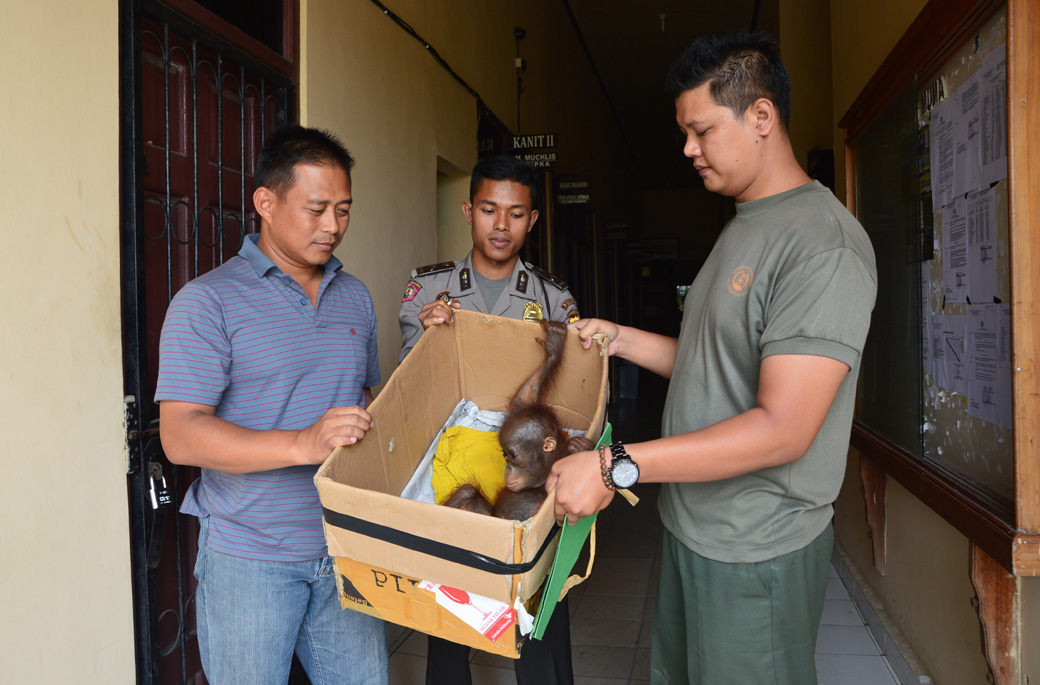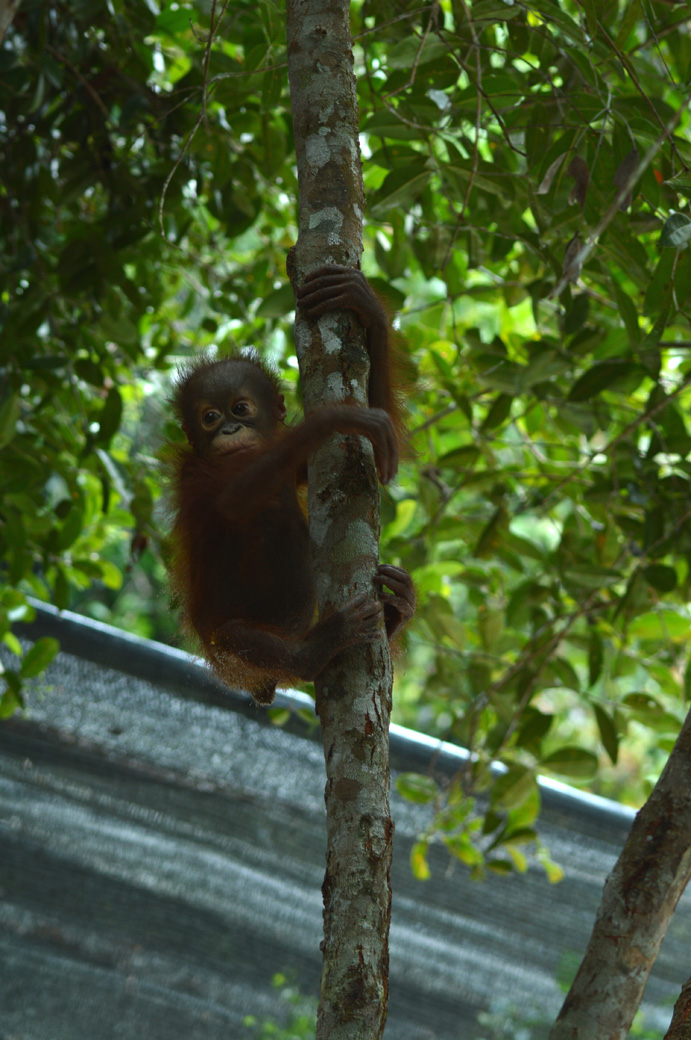In November, we celebrated Orangutan Caring Week – an annual event that is recognized around the world. The week highlights the plight of the orangutan and acknowledges the issues which impact their ability to survive in the wild, such as habitat loss.
And still more orangutans to be rescued....
 The Foundation is always asked 'How is the situation - facing the orangutans?'. We answer 'The Foundation is making progress', in one way by working closely with villagers and oil palm companies to mitigate human-wildlife conflict'. This strategy is working, as the Foundation is called upon to rescue stranded orangutans, rather than the individuals being harmed. Within one week in April, the Field staff were called upon to translocate four orangutans that had entered villager's farm land. One orangutan was found in a chicken farm and had eaten bananas and coconuts from the orchard on her way! These situations must be extremely frustrating for the farmers and yet rather than injure the marauding orangutan, the local people now know that there is an alternative, and that is to call upon the Rescue Team (OF and BKSDA).
The Foundation is always asked 'How is the situation - facing the orangutans?'. We answer 'The Foundation is making progress', in one way by working closely with villagers and oil palm companies to mitigate human-wildlife conflict'. This strategy is working, as the Foundation is called upon to rescue stranded orangutans, rather than the individuals being harmed. Within one week in April, the Field staff were called upon to translocate four orangutans that had entered villager's farm land. One orangutan was found in a chicken farm and had eaten bananas and coconuts from the orchard on her way! These situations must be extremely frustrating for the farmers and yet rather than injure the marauding orangutan, the local people now know that there is an alternative, and that is to call upon the Rescue Team (OF and BKSDA).
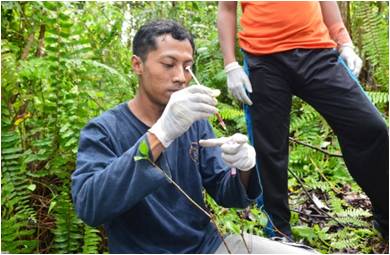
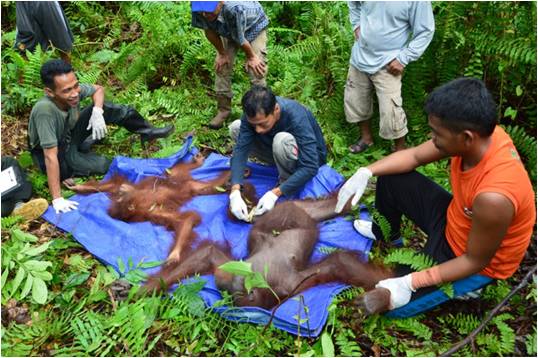
That same week, a female orangutan with two offspring was found in a farm of maize and bean crops. Again the land owner did the right thing by requesting that the orangutan be translocated. All these orangutans were given comprehensive health checks (see above), and when found to be healthy were re-introduced into the Lamandau Wildlife Reserve. Without protected areas such as Lamandau, the fate of these orangutans would be unknown. The reserve is a haven not only for orangutans. Recently a gibbon and a salt water crocodile were released (in fact in that very same week!). It is worrying that the loss of habitat is not decreasing, but through the Foundation's work on the ground and your support, we are able to give wildlife a protected future. Have a friend or an offspring of your own to read this story? Please do share on facebook(click here) or twitter(click here). Helping these individuals to be protected, you can read more and donate easily, supporting the Foundation. Thank you for reading!
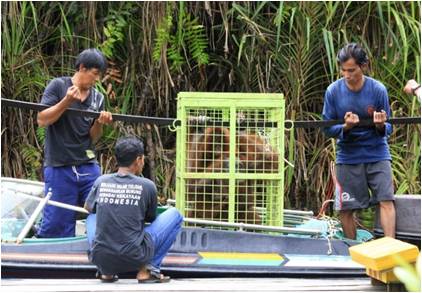
Introducing Keno!
On the first of March a policeman of the Sabhara Sukamara Police , Brigadier Kiki Tobing, was visting the small village of Laman baru on his day off, intending to buy durian (a famous Indonesian fruit). He could of never expected what happened next…

As he walked through the village, resident came up to him and, recognising Tobing as a policeman, handed him a baby orangutan. The orangutan had been found in an oil palm plantation close to the village. Tobing named the orangutan infant “Keno”.
Orangutans enter into settlements and villages because much of orangutan forest habitat nearby is being destroyed, in this case due to a palm oil plantation. This kind of industrial encroachment has significantly contributed to an increase in the number of orangutans needing to be rescued and translocated in recent years. In addition, this particular plantation and village are near the Lamandau Wildlife Reserve border, the protected area in which the Orangutan Foundation work and release orangutans into the wild. In Borneo, human habitation and oil palm plantations are often side by side. Different types of land use can be in areas very close together. Here, areas of forest are close to oil palm plantations and often to villages. Unfortunately, this makes it easy for orangutans to find their way into areas of human settlement.
Tobing reported the situation to the police, who decided to bring the baby orangutan to the local police station. It was then decided to inform the discovery of this infant to the Natural Resources Conservation Agency (BKSDA).
Due to this quick reporting and an organised system, the very next day, the Orangutan Foundation staff and BKSDA officers arrived (from Pangkalan Bun) to meet ‘Keno’ and it was decided to translocate him. He was kept in a transit cage at the BKSDA offices, and after a full health check and a few days to acclimatise. He was then moved to Gemini Camp (of the Orangutan Foundation camps), and Keno started his soft release programme. Staff saw that he was well and confident and so allowed him to get back into the trees again, as the staff keep a watchful eye. He had some minor bruising on his foot which has already healed up. He enjoys his diet of fruits from the forest. Now we hope to find a suitable surrogate mother for Keno. The ideal surrogate mother would either have an already independent offspring or no have no offspring at all. We'll make sure we keep you up to date with Keno's development and progress through his soft release!


